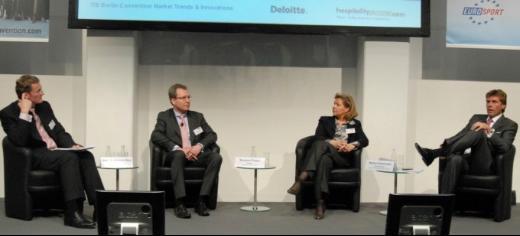3. ITB Hospitality Day discussed qualitative hotel property evaluation
 |
Berlin (March 28, 2008). It`s certain to be some time before banks and investors start to take qualitative factors into account when making their assessments of hotel properties with respect to financial decisions. In day-to-day business, so-called "soft factors" still play only a minor role, as the talk round on "value drivers in hotel property evaluation" during the 3rd ITB Hospitality Day in Berlin showed. An academic, two consultants and a hotelier discussed a question which is usually discussed only among smaller or internal circles.
Prof Christian Buer, Dean of the University of Heilbronn, introduced listeners to the generally dry yet nonetheless extremely interesting subject matter as presenter: For historical reasons, hotel properties still today are considered a relatively secure investment. However, banks still often ask about other criteria: "Whereas in the past they would ask whether the hotel was part of an international reservation system, today they ask about target groups, competitors and value indicators."
The experts differentiate here between two key indicators, the "lagging" and the "leading" indicators. The former include typical finance orientated factors (turnover, costs, profit margins etc.) and the latter the non-finance orientated factors (organisation of services, number of returning guests, market share etc.). Are such points actually asked about in practice? Benjamin Ploppa, Manager at the consultancy company Deloitte, can report that banks and investors today at least want to know more about the human capital of the business.
Martina Fidlschuster, Managing Director of the hotel specialised consultancy firm Hotour in Frankfurt, sees things much more soberly: "The banks still very much orientate themselves using their own ratings and these are made up from anything between 50 to 70% of `hard facts`." Bankers still strongly differentiate between the property and the business. Although they still ask about "operator factors", they generally have too little time to ask about qualitative value drivers. A value perspective is in their eyes a "goodwill" factor. Comparing the chances that chain or private hoteliers have in questions of finance, her conclusion is this: private hoteliers will in future find it increasingly difficult.
Five topics to measure quality, says Deloitte
So how do you measure quality? What are the core quality factors necessary for the success of a hotel? Deloitte took a close look at exactly these questions at the start of the year when it undertook a study on "qualitative value drivers in the German hotel industry". The study looked at 5,000 hoteliers and 850 business and leisure travellers concentrating on five topic areas: human capital, location, innovation, marketing and environment: All in all, hoteliers considered qualitative factors more important than their guests. This shows that the hotel industry is especially sensitive to qualitative value drivers. Location is and remains the most important success factor, both for hoteliers as for guests. Viewed as just as important, both by hoteliers and guests, is human capital.
In practice, of all the areas looked at by Deloitte, human capital seems to be the one focused on the most. "Staff loyalty automatically leads to increased guest satisfaction," Carsten Rath clarified, CEO of Arabella International (ArabellaStarwood Hotels) - and that is something the hotel groups have been able to measure professionally for years. Guest satisfaction is reflected in the value of the company. According to Rath, the brand also plays a role here.
ArabellaStarwood is one of those hotel groups to have several brand changes/ expansions behind it (from Arabella to ArabellaSheraton and ArabellaStarwood all the way to individual Starwood brands today) and is so able to measure the influence of various brands. Rath gave one of the hotel group`s flagship hotels as an example: the 5 star resort Mardavall in Majorca, that up to now had achieved an ARR of 450 Euros and in future expects an increase of 30 Euros on this. According to Rath, this extra 30 Euros is possible because at the end of the year 2007/2008, the hotel received a new internationally more prestigious brand name with higher quality promise: The St. Regis Mardavall. With respect to a property sale, Carsten Rath concludes, the image plays a much more decisive role than yield value.
The brand is a key
The buzz word "brand" developed into one of the core topics within the discussion, and once again the special case of the "special property" became clear: In contrast to the well know retail brands (such as BMW, Audi, Cola), the hotel product brings with it high customer loyalty. The reason: In the hotel, everything is a matter of service, and this is crucially dependent on staff. The single restriction, the hotelier comments, is that customer loyalty can be partially steered by a bonus points system.
The core conclusion of the talk round: in the evaluation of "soft" and/or "hard" quality factors, extreme differences in the professionalism of those supposed to evaluate hotel property are apparent. / map
To print this article you have to be registered and logged in for newsletter, visitor or subscription.





